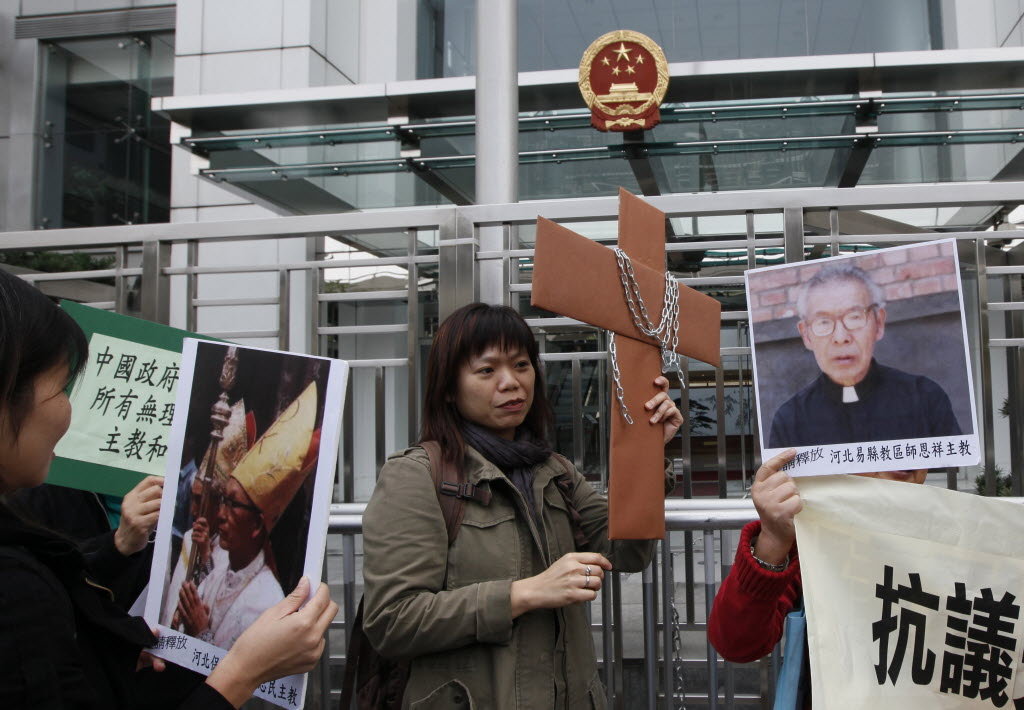
 Observers of the Church in China say a recent document issued by the Vatican about laity formation and Church principles answered the call for clarity but would not yield immediate results. Ren Yanli, a former researcher with the Chinese Academy of Social Sciences in Beijing, said the communiqué was consistent with the Vatican’s position on the China Church and met many expectations.
“I think the most notable sentence is ‘evangelization cannot be achieved by sacrificing essential elements of the Catholic faith and discipline,†Ren said. “It did not mention relations with the Chinese government, showing the Vatican no longer wants to do things on its own wishful thinking.â€He added that the effect of the communiqué would depend on how Chinese Catholics react to it.
 Anthony Lam Sui-ki, a senior researcher at Hong Kong diocese’s Holy Spirit Study Centre, said the Vatican document would have long-term effects. He said that of the two focal points of the document – laity formation and faithfulness to Church principles – formation was “important but less urgent.â€
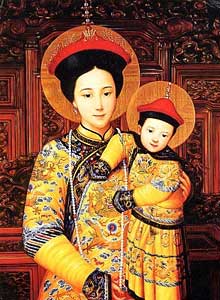  The morale of the lay faithful is greatly affected by the behavior and integrity of their bishops, so observing Church principles is the first priority, he said. “The major premise of evangelization should be keeping the completeness of the mystical body of Christ,†he said. Kwun Ping-hung, a Hong Kong-based observer, says laity formation and observing Church principles are interrelated and inseparable, for “if some bishops’ words and deeds obfuscated the clarity of the face of the Church, how can integral formation of lay Catholics be achieved?â€
 The morale of the lay faithful is greatly affected by the behavior and integrity of their bishops, so observing Church principles is the first priority, he said. “The major premise of evangelization should be keeping the completeness of the mystical body of Christ,†he said. Kwun Ping-hung, a Hong Kong-based observer, says laity formation and observing Church principles are interrelated and inseparable, for “if some bishops’ words and deeds obfuscated the clarity of the face of the Church, how can integral formation of lay Catholics be achieved?â€
The communiqué criticized two types of bishops – illegitimate bishops who have carried out acts of jurisdiction or who have administered the Sacraments, and legitimate bishops who have participated in illegitimate episcopal ordinations. However, “it does not make a clear stance on those bishops who have received pardon from the Vatican but then participated in recent legitimate ordinations together with illegitimate bishops,†observed Kwun, who is not a Catholic. It also does not touch on other elements, including the political environment that has caused difficulties for the China Church and certain decisions by the Vatican that brought about disagreements among Chinese Catholics, Kwun added. This could help the Vatican to set up various channels of dialogue with China but would not resolve the divisions and confusion among mainland clergy and faithful, and therefore weakened the communiqué’s guiding function, Kwun said.
Article taken from ucanews.com - http://www.ucanews.com
URL to article:Â http://www.ucanews.com/2012/05/10/check-vatican-document-on-china-leaves-open-questions/
  On April 16-20, 2012, two important meetings of the Province were held at St. Albert’s Priory, Rosaryhill, Hong Kong: the meeting of the Provincial Council of Formation and the Extended Council of the Province. Both meetings were presided by our Prior Provincial Fr. Javier Gonzalez, OP. Among others, two main topics were addressed by the Provincial Council of Formation: the revision and updating of the Ratio Formationis Particularis (RSP) and the reports of the Brothers in charge of the different stages of formation, including postulancy, novitiate, studentate and ongoing formation. Eleven members attended the meeting (April 16-17), including three members of our St. Dominic’s Priory: Frs. Jarvis, Jose Luis and Fausto.
 For its part the Extended Council of the Province tackled on the first day, the approval of 2011 yearly accounts of the Vicariates and Houses under the Prior Provincial and the budget, including extraordinary expenses for 2012. The accounts were approved and also the extraordinary expenses. The 2012 approved extraordinary expenses of our Priory will be the following: the re-modeling and re-equipment of our kitchen, the closing or covering up of the open balconies in the different floors, and repairs of some walls and floors of the building. On the second day, many items were discussed: the reading and approval of the acts from the meetings of the different Vicariates; special matters from various Vicariates, and themes on formation. Among the items on formation: the approval of the RSP presented by Fr. Javier, who shall send the text to the Master of the Order Fr. Bruno for final approval. Other matters treated were the initial preparation of the next Provincial Council to be held in Avila about the end of September, 2013, and also some from the Dominican Curia in Rome. Twenty four members attended the Council of the Province: members from Hong Kong –Macau, from the convents and houses in Asia and from the Vicariate of Spain. The embers of our Priory that attended the Provincial Council were: Frs. Alex and José, the Regent of Studies and the Master of Students.
  Among the members attending the two Councils, some were able to visit our Priory: Fr. Fernando Muñoz, missionary in Myanmar; Frs. Pedro Juan and Fernando Mañero from our Convents in Madrid; Fr. Pedro Luis Gonzalez, from our House in Rome.
 Among the members attending the two Councils, some were able to visit our Priory: Fr. Fernando Muñoz, missionary in Myanmar; Frs. Pedro Juan and Fernando Mañero from our Convents in Madrid; Fr. Pedro Luis Gonzalez, from our House in Rome.

On the Feast of St. Thomas Aquinas, January 28, 2012, the new Dominican Center of Institutional Studies of the Province of Our Lady of the Rosary was solemnly inaugurated at St. Dominic’s Priory, Macau. The new center is called St. Dominic Center of Studies.
The inauguration program began at ten in the morning with an Academic Act, the first 2012 Aquinas Lecture, and continued with the celebration of the Eucharist in honor of our brother St. Thomas Aquinas. The Academic Act started with the Opening Address of Fr. Javier Gonzalez, OP. Prior Provincial of Our Lady of the Rosary Province. It continued with the Reading of the Decree of Fr. Bruno Cadoré, OP, Master of the Dominican Order Establishing the Center of Institutional Studies by Fr. Alejandro Salcedo, OP, Prior, St. Dominic’s Priory, Macau.
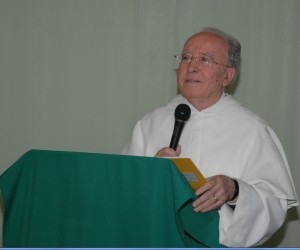 The Inaugural Lecture entitled “Place of Study in the Dominican Order†was delivered by Fr. Fausto Gomez, OP, Regent of Studies of this Dominican Province, and professor of the University of Saint Joseph, Macau and the University of Santo Tomas, Manila. The Response was given by Professor Anna Chan, Vice-Rector for Student Affairs of the University of Saint Joseph. (By the way, the School of Christian Studies of the University of Saint Joseph collaborates closely with our Center in the theological formation of the Dominican students in Macau). The program ended with the joyful singing of the Te Deum.
The Inaugural Lecture entitled “Place of Study in the Dominican Order†was delivered by Fr. Fausto Gomez, OP, Regent of Studies of this Dominican Province, and professor of the University of Saint Joseph, Macau and the University of Santo Tomas, Manila. The Response was given by Professor Anna Chan, Vice-Rector for Student Affairs of the University of Saint Joseph. (By the way, the School of Christian Studies of the University of Saint Joseph collaborates closely with our Center in the theological formation of the Dominican students in Macau). The program ended with the joyful singing of the Te Deum.
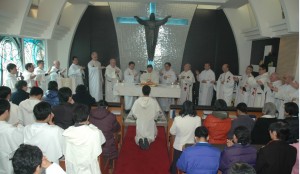 The Celebration of the Holy Eucharist in honor of St. Thomas Aquinas was presided by the Bishop of Macau, His Excellency the Most Rev. José Lai, DD. It was concelebrated by 18 priests: Dominicans from the communities of Hong Kong and Macau and other secular and religious priests working in the Diocese of Macau. After the proclamation of the Gospel, Fr. Jarvis Sy, OP, Master of Students, read the appointment of Fr. Jose Luis de Miguel, OP, as the new Moderator of Studies of Our Lady of the Rosary Province. Afterwards, Fr. Jose Luis made the Profession of Faith and the Oath of Fidelity – required by the normative of the Church. He then pronounced the Homily focused on his new responsibilities as Moderator of Studies. After Communion, Bishop José Lai spoke some words of gratitude, joy and encouragement. The Mass ended with the singing of “Joyful Friar.â€
The Celebration of the Holy Eucharist in honor of St. Thomas Aquinas was presided by the Bishop of Macau, His Excellency the Most Rev. José Lai, DD. It was concelebrated by 18 priests: Dominicans from the communities of Hong Kong and Macau and other secular and religious priests working in the Diocese of Macau. After the proclamation of the Gospel, Fr. Jarvis Sy, OP, Master of Students, read the appointment of Fr. Jose Luis de Miguel, OP, as the new Moderator of Studies of Our Lady of the Rosary Province. Afterwards, Fr. Jose Luis made the Profession of Faith and the Oath of Fidelity – required by the normative of the Church. He then pronounced the Homily focused on his new responsibilities as Moderator of Studies. After Communion, Bishop José Lai spoke some words of gratitude, joy and encouragement. The Mass ended with the singing of “Joyful Friar.â€
About sixty persons attended the Academic Act and the sixty plus twenty more participated in the Holy Eucharist. About forty of them were Dominican priests and brothers from the two communities in Hong Kong and the one of Macau. Also present were about twenty sisters and aspirants of the Congregation of the Missionary Dominican Sisters of the Rosary in Macau. Some of the people who attend our Sunday Mass also attended the Mass in honor of St. Thomas.
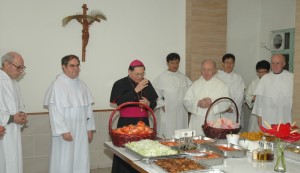 After the celebration of the Mass, all the people were invited to a simple, varied and tasteful lunch.
After the celebration of the Mass, all the people were invited to a simple, varied and tasteful lunch.
As Fr. Javier said, it was indeed a day to remember, a historic day. (JLC)

Download PDF:Â Ratio Studiorum Particularis by MO
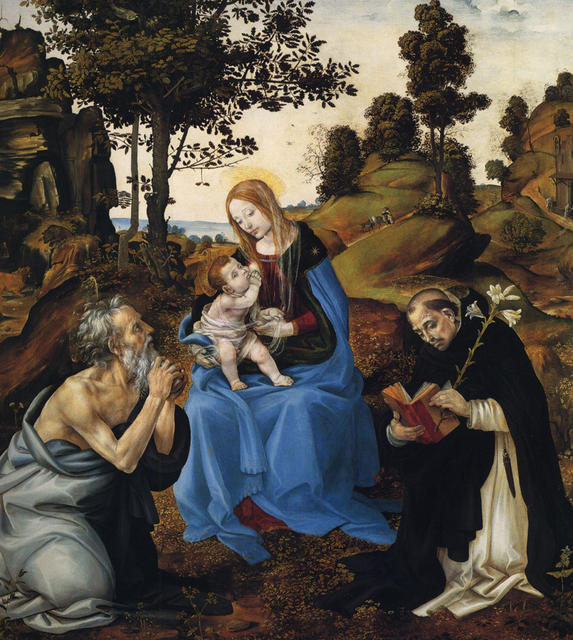
PREACHERS ALLÂ
Our student brothers preached the Word of God in the Chapel of St. Dominic’s Priory during the 2011 Advent Season
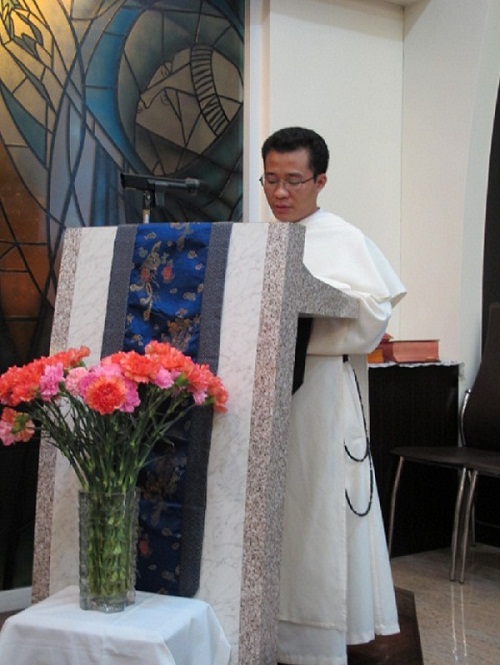
Brother Mariano Kai, O.P
“Remain in him now, little ones, so that, when he reveals himself, we may be fully confident and not retreat in shame at his coming.â€(1Jn 2:28)

Brother Antonio Lee,O.P
“I am the voice of one crying out in the wilderness.â€Â (John 1:23)

  Brother Paul Win Aung Myint, O.P
 “Hail Mary, Full of Graceâ€(Luke 1:28)
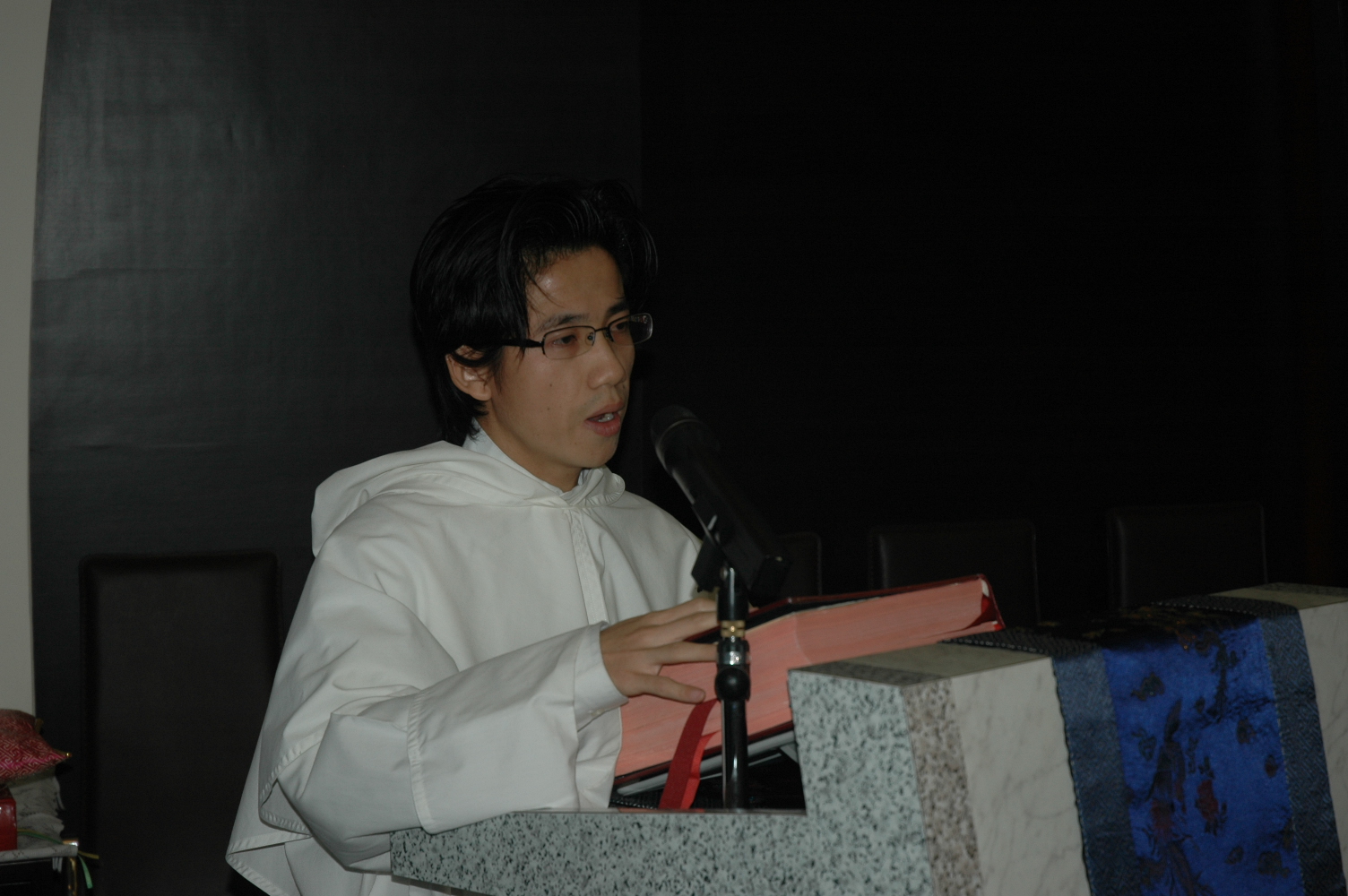
Brother Isaac Saw Aye Sei, O.P
 “Beware, keep alert; for you do not know when the time will come.â€Â  (Mark 13: 33)
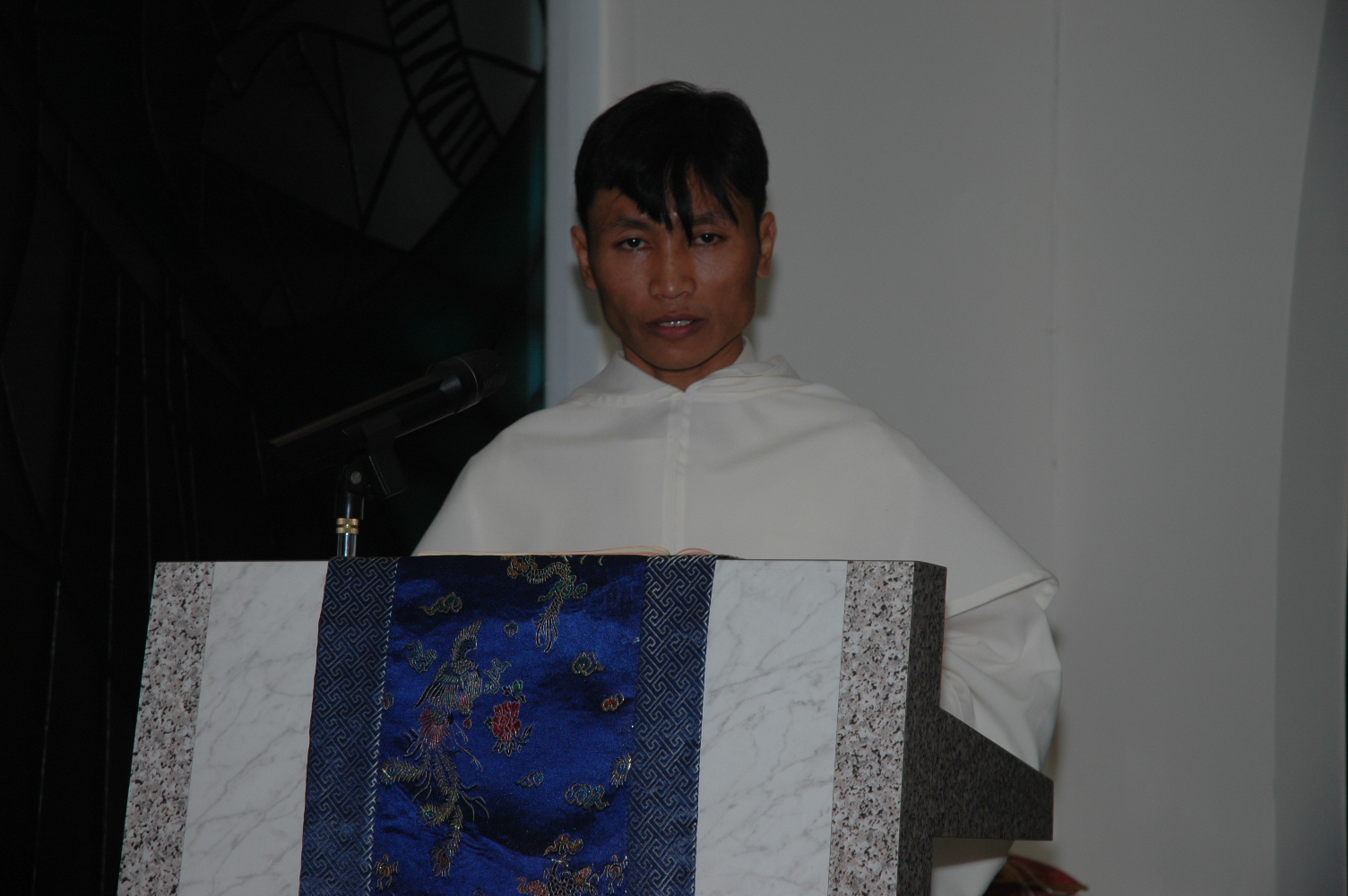
Brother Gregorio, O.P
 “We are saved by grace through faith and not by works.†(Ephesians 2:8)

Brother Sebastian Lee, O.P
 “Blessed are you among women, and blessed is the fruit of your womb.â€Â  (Luke 1: 42)

Brother Mario Oo Shwe, O.P
 “I hope you maintain permanent contact with Jesus, that His joy and strength might help you to live in this world.â€
  (From Pope Benedict XVI spoke of preparation for Christmas)

Brother Peter Phan Ngo Xuan Thoai, O.P.
“The Lord is not slow about his promise, as some think of slowness, but is patient with you,
not wanting any to perish, but all to come to repentance.†(2Peter 3:9)

DOMINICAN CHARISM, A WAY OF LIFE
(Interview with Fr. Bruno Cadore, MOP)
(The interviewer is DarÃo Menor for the weekly journal VIDA NUEVA, Madrid. His interview is entitled: “BRUNO CADORÉ, MAESTRO GENERAL DE LOS DOMINICOS.†Dario Menor comments: “Now Fr. Cadoré will have to guide through the next nine years the friars, nuns, sisters and lay persons that form one of the most important congregations of the Church. The Master of the Order of Preachers recognizes that the Dominican charism must be actualized but without provoking any fracture. According to him, ‘continuity must be sought’. He proposes ‘listening to the human beings’ as a solution for the scarcity of vocations, because ‘spirituality continues shaping the principal part of the life of a person’.â€)
(For the whole interview, conducted and published in Spanish, please go to VIDA NUEVA, n. 2.740, 5-11 February, 2011, pp. 40-41)
 Question: What does it mean to be a Dominican today?
Question: What does it mean to be a Dominican today?
Answer: It means to be a friar, a brother, and a preacher. We choose to be friars and brothers of humanity. We choose to be brothers of those who feel close in faith and in the Church, but also of those who are away from us. We believe that fraternity, brotherhood, is a gift of God to the world. St Dominic de Guzman made this choice in his time, when he began preaching. He decided to be close to the people thus giving an example of humanity and of life in community.
Question: Does the Dominican charism need renewal to be able to face modern society?
Answer: Yes, we have to actualize our charism to face a different culture – different here in the West as well as in Africa or Asia. Religions have also changed. Nevertheless, some basic things do not change: to be friends of the people; to be preachers and give the best of ourselves so that the people understand that God is something marvelous for them.
Question: Is religious life an option for the youth today? How do you explain the scarcity of vocations in the West?
Answer: In the first place, because perhaps the youth does not even know us. Religious life is not a way of doing things, but a way of living in community. In France, the last month of September we had ten novices in the two Dominican Provinces. This is not bad. But the numbers mean nothing. Even if we had one vocation only it would be equally good.
Question: The future of religious congregations is then in Asia and Africa?
Answer: Also in Latin America and in the United States. It can be in any place. For this we should continue believing that God wants to talk with humanity. We have to give him our trust. At times we think that people are not interested in spirituality, but we are wrong. This spirituality shapes the principal part of the life of a person. What we have to do is to listen to the human beings, to listen to their hopes.
Question: You studied Medicine and practiced as a pediatric physician in Haiti. Do you think that the field of health is a good field for evangelization?
Answer: Health is a good topic of conversation with any person: we are all interested in life… When you are sick you realize that the body is one unity of your body, your mind and your spirit. Health is something marvellous that offers to us a great opportunity for dialogue and a path to help persons become better. … Health is not the only way, but it is one option… Life, death and hope will always disturb us.
Question: How are the Dominicans developing “intercongregationality� What are your plans as the Master of the Order of Preachers?
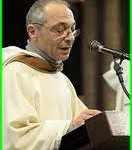
Answer: The truth is I have no plans. I could not imagine that I would be elected the Master of the Order. Besides, the Master of the Order must have no plans, but listen and obey what the General Chapter of the Order says. This is the true authority of our Congregation. The Chapter did not discuss much on interrelationships among religious congregations. However, we may consider it in the future. Certainly relations among the different religious congregations, intercongregationality is important because it places the gift each one of us has received on the same current.
Question: What were the main questions of the last General Chapter that elected you as Master of the Order?
Answer: We talked much on the diversity of the Dominican family, composed of brothers, sisters and lay persons. We have to support each other to find our complementariness to preach.
Question: Do you agree with your predecessor who said that optional celibacy might benefit the Church?
Answer: We are religious, celibacy is our choice. We are the ones who have decided to adopt the Religious Life which is lived this way.

  The morale of the lay faithful is greatly affected by the behavior and integrity of their bishops, so observing Church principles is the first priority, he said. “The major premise of evangelization should be keeping the completeness of the mystical body of Christ,†he said. Kwun Ping-hung, a Hong Kong-based observer, says laity formation and observing Church principles are interrelated and inseparable, for “if some bishops’ words and deeds obfuscated the clarity of the face of the Church, how can integral formation of lay Catholics be achieved?â€
 The morale of the lay faithful is greatly affected by the behavior and integrity of their bishops, so observing Church principles is the first priority, he said. “The major premise of evangelization should be keeping the completeness of the mystical body of Christ,†he said. Kwun Ping-hung, a Hong Kong-based observer, says laity formation and observing Church principles are interrelated and inseparable, for “if some bishops’ words and deeds obfuscated the clarity of the face of the Church, how can integral formation of lay Catholics be achieved?â€

















